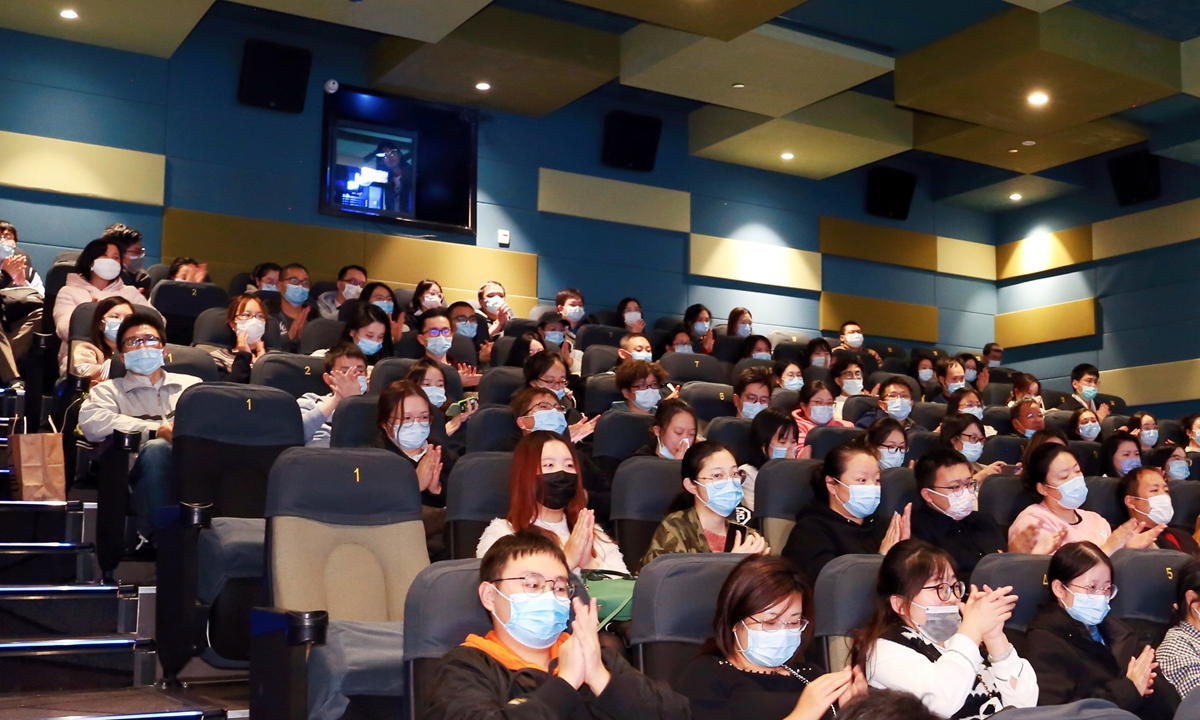ARTS / FILM
Chinese film industry looking up amid COVID-19 gloom
Bright future

The audiences watch a film at a cinema in Shanghai on November 12, 2021. Photo: VCG

A man walks past a poster for movie The Battle at Lake Changjin in a cinema in Shanghai on October 10, 2021. Photos: VCG
With the arrival of 2022, the Chinese people enjoyed a three-day New Year holiday, providing the nation's box office with a good opportunity to score impressive gains.On January 1, the box office takings totaled approximately 470 million yuan ($73.8 million), according to the China Movie Data Information Network on Sunday. The figure is a significant improvement on the same day in 2020, when the takings totaled 290 million yuan, suggesting that the industry is rebounding after a difficult period.
The mood of optimism was summed up by one comment on microblogging platform Sina Weibo: "China has entered a new era of filmmaking which has outstanding actors, attractive stories, breakthroughs in technology and elaborately forged background music, and therefore will enjoy good results at the box office."
With the world still overshadowed by the protracted pandemic, China has seen rapid recovery and development in many fields, the movie market in particular. Due to the industry's positive momentum, China's film market has maintained its position as a global frontrunner for the second year in a row.
At the top
China nabbed the top spot in the global box-office chart in 2021, with its revenue for the year surpassing 47.2 billion yuan, according to statistics released by the China Film Administration. This is a huge jump from the 20 billion yuan recorded in 2020 and a further step toward pre-pandemic levels, sending a message of confidence to filmmakers in China and beyond.
Domestic blockbusters were the mainstay of the recovery from the impact of COVID-19. In 2021, domestically produced films generated nearly 40 billion yuan, accounting for approximately 84.5 percent of 2021's total box-office takings, according to the administration.
Eight of 2021's top 10 earners at China's box office are domestic productions.
With a total revenue of over 5.77 billion yuan since its debut on September 30, 2021, the patriotic Chinese blockbuster The Battle at Lake Changjin is undoubtedly the biggest winner. It is currently the highest-grossing title of all time at China's box office, as well as one of the top earners globally in 2021.
Co-directed by three top directors - Chen Kaige, Hark Tsui and Dante Lam - the movie tells the story of Chinese People's Volunteer soldiers fighting bravely in freezing temperatures in a key campaign of the War to Resist US Aggression and Aid Korea(1950-53) at Lake Changjin, or Chosin Reservoir, and has moved many moviegoers to tears.
Meanwhile, the tear-jerker comedy Hi, Mom, another dark horse in the past year, completed its run with over 5.4 billion yuan, becoming the third highest-grossing title of all time at China's box office.
Other films from various genres have also reported big takings: the Chinese spy thriller Cliff Walkers, which won three prizes at the 34th Golden Rooster Awards; 1921, a production intended to provide a panoramic view of the founding of the Communist Party of China 100 years ago; and Sister, a feature film based around a sibling relationship.
Their success demonstrates the variety of rich themes offered up by China's film industry and the huge potential of the market.
Yin Hong, vice chairman of the China Film Association and a professor at Tsinghua University, pointed out that the new mainstream films follow some basic rules, such as focusing on individuals, having obvious characteristics of the genre, attaching importance to visual and audio effects and presenting shared values.
A step up
China's success in 2021 was not limited to the scale of its market, but also reflected a leap forward in the movie-making industry in general.
Modern technology was applied to great effect in creating magnificent war scenes and realistic views of overseas locations, with the aim of bringing visual impact and enjoyment to the audience.
Official data also shows that the number of movie screens across the country reached 82,248 in 2021, the most of any country, up 6,667 on the previous year.
The Chinese movie industry has transitioned to a stage of high-quality development, according to a government plan for promoting the development of the industry during the 2021-25 period.
The document also foresees greater improvements in the quality of domestic movies and calls for more quality sci-fi and animated films.
Hailing the excellent performance of the Chinese box office under pandemic prevention and control measures, Liu Haibo, a professor at the Shanghai Film Academy, Shanghai University, said that China's film industry has taken strides on the path to high-quality development.



